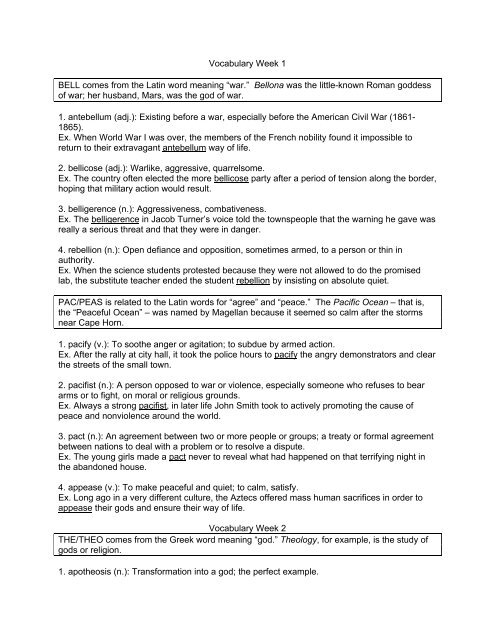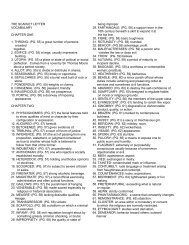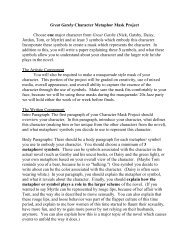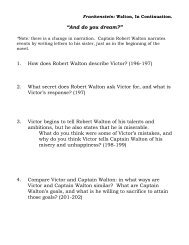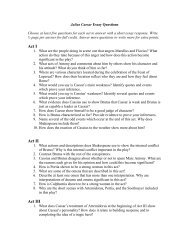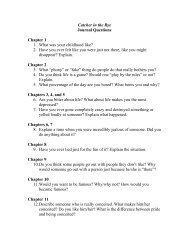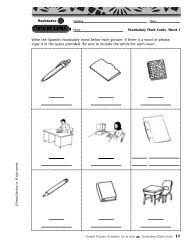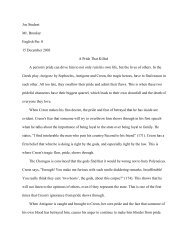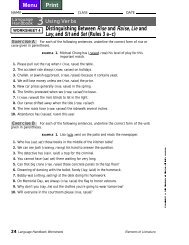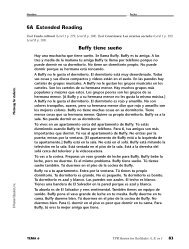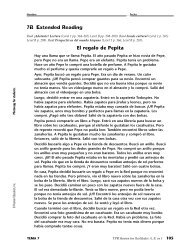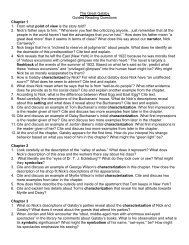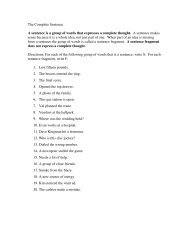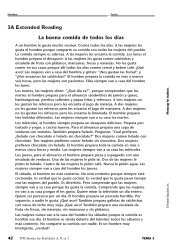Greek and Latin Roots Vocabulary List - CIBACS
Greek and Latin Roots Vocabulary List - CIBACS
Greek and Latin Roots Vocabulary List - CIBACS
You also want an ePaper? Increase the reach of your titles
YUMPU automatically turns print PDFs into web optimized ePapers that Google loves.
<strong>Vocabulary</strong> Week 1<br />
BELL comes from the <strong>Latin</strong> word meaning “war.” Bellona was the little-known Roman goddess<br />
of war; her husb<strong>and</strong>, Mars, was the god of war.<br />
1. antebellum (adj.): Existing before a war, especially before the American Civil War (1861-<br />
1865).<br />
Ex. When World War I was over, the members of the French nobility found it impossible to<br />
return to their extravagant antebellum way of life.<br />
2. bellicose (adj.): Warlike, aggressive, quarrelsome.<br />
Ex. The country often elected the more bellicose party after a period of tension along the border,<br />
hoping that military action would result.<br />
3. belligerence (n.): Aggressiveness, combativeness.<br />
Ex. The belligerence in Jacob Turner’s voice told the townspeople that the warning he gave was<br />
really a serious threat <strong>and</strong> that they were in danger.<br />
4. rebellion (n.): Open defiance <strong>and</strong> opposition, sometimes armed, to a person or thin in<br />
authority.<br />
Ex. When the science students protested because they were not allowed to do the promised<br />
lab, the substitute teacher ended the student rebellion by insisting on absolute quiet.<br />
PAC/PEAS is related to the <strong>Latin</strong> words for “agree” <strong>and</strong> “peace.” The Pacific Ocean – that is,<br />
the “Peaceful Ocean” – was named by Magellan because it seemed so calm after the storms<br />
near Cape Horn.<br />
1. pacify (v.): To soothe anger or agitation; to subdue by armed action.<br />
Ex. After the rally at city hall, it took the police hours to pacify the angry demonstrators <strong>and</strong> clear<br />
the streets of the small town.<br />
2. pacifist (n.): A person opposed to war or violence, especially someone who refuses to bear<br />
arms or to fight, on moral or religious grounds.<br />
Ex. Always a strong pacifist, in later life John Smith took to actively promoting the cause of<br />
peace <strong>and</strong> nonviolence around the world.<br />
3. pact (n.): An agreement between two or more people or groups; a treaty or formal agreement<br />
between nations to deal with a problem or to resolve a dispute.<br />
Ex. The young girls made a pact never to reveal what had happened on that terrifying night in<br />
the ab<strong>and</strong>oned house.<br />
4. appease (v.): To make peaceful <strong>and</strong> quiet; to calm, satisfy.<br />
Ex. Long ago in a very different culture, the Aztecs offered mass human sacrifices in order to<br />
appease their gods <strong>and</strong> ensure their way of life.<br />
<strong>Vocabulary</strong> Week 2<br />
THE/THEO comes from the <strong>Greek</strong> word meaning “god.” Theology, for example, is the study of<br />
gods or religion.<br />
1. apotheosis (n.): Transformation into a god; the perfect example.
Ex. After his assassination, Abraham Lincoln underwent an apotheosis that transformed the<br />
controversial politician into a saintly father of democracy.<br />
2. atheistic (adj.): Denying the existence of God or divine power.<br />
Ex. The atheistic Madalyn Murray O’Hare successfully sought the removal of prayer from<br />
American public schools in the 1960s.<br />
3. pantheistic (adj.): Seeing the power of God in all the natural forces of the universe;<br />
worshiping all gods of all creeds <strong>and</strong> cults.<br />
Ex. Her personal religion was almost pantheistic; she saw the holy books of Hinduism <strong>and</strong> the<br />
rituals of Caribbean folk religion as expressions of the same essential truths.<br />
4. theocracy (n.): Government by officials who are regarded as divinely inspired; a state<br />
governed by religious leaders.<br />
Ex. The ancient Aztecs lived in a theocracy in which guidance came directly from the gods<br />
through the priests.<br />
PROB/PROV comes from the <strong>Latin</strong> words for “prove or proof” <strong>and</strong> “honesty or integrity.” To<br />
prove a statement is to “make it honest,” <strong>and</strong> probate court is where the genuineness of the wills<br />
of deceased people must be proved.<br />
1. approbation (n.): A formal or official act of approving.<br />
Ex. The United States Senate signaled its approbation of the new environmental plan by voting<br />
for it unanimously last Wednesday in a special session.<br />
2. disprove (v.): To show that something is not what it has been claimed to be; refute.<br />
Ex. A week before the election, Jane disproved her opponent’s lies about her supposed<br />
connections to organized crime.<br />
3. probity (n.): Absolute honest <strong>and</strong> uprightness.<br />
Ex. Over the course of the years, Heather’s unquestioned probity helped to win her the respect<br />
of her fellow judges on the panel.<br />
4. reprobate (n.): A person of thoroughly bad character.<br />
Ex. Finally, on the verge of physical <strong>and</strong> financial ruin, the reprobate dropped his lowlife friends,<br />
found an honest job, <strong>and</strong> begged his girlfriend to come back.<br />
<strong>Vocabulary</strong> Week 3<br />
CAP/CEP/CIP comes from capere, the <strong>Latin</strong> verb meaning “take, seize.” Capture, which is what<br />
a captor does to a captive has the same meaning.<br />
1. reception (n.): The act of receiving; a social gathering where guests are formally welcomed.<br />
Ex. Although the board of director’s immediate reception of Jamie’s plan was enthusiastic, it<br />
was months before anything concrete was done about it.<br />
2. incipient (adj.): Starting to come into being or to become evident.<br />
Ex. Henry felt the stirrings of incipient panic as he riffled through the file <strong>and</strong> realized that the<br />
letter had been removed.<br />
3. perceptible (adj.): Noticeable or able to be felt by the senses.
Ex. Mayra’s feelings about Garret were barely perceptible to him because she always became<br />
quiet <strong>and</strong> shy when he was around.<br />
4. susceptible (adj.): Open to some influence; responsive.<br />
Ex. Impressed with her intelligence <strong>and</strong> self-confidence, Josh was highly susceptible to Emily’s<br />
positive influence, so they decided to study together more often.<br />
FIN comes from the <strong>Latin</strong> word for “end” or “boundary.” Final describes last things, <strong>and</strong> a finale<br />
or a finish is an ending.<br />
1. affinity (n.): Sympathy; attraction<br />
Ex. Felix Mendelssohn showed an affinity for music at a very early age <strong>and</strong> composed several<br />
fully developed symphonies while still in his early teens.<br />
2. definitive (adj.) Authoritative <strong>and</strong> final.<br />
Ex. After a ten year study, the team’s brilliant research provided a definitive description of the<br />
virus <strong>and</strong> its strange mutation patterns.<br />
3. infinitesimal (adj.): Extremely or immeasurably small.<br />
Ex. Looking more closely at the research data, Jared now saw an odd pattern of changes so<br />
infinitesimal that they had not been noticed before.<br />
4. finite (adj.) Having definite limits.<br />
Ex. Jason’s dreams about his future as a rock singer are infinite, but the time he can spend<br />
pursuing these dreams are quite finite since he has a full time job <strong>and</strong> a family to support.<br />
<strong>Vocabulary</strong> Week 4<br />
TRACT comes from trahere, the <strong>Latin</strong> verb meaning “drag or draw.” Something attractive draws<br />
us toward it.<br />
1. detract (v.): to decrease the importance, value, or effectiveness of something.<br />
Ex. None of the gossip or racy subject matter in the new biography detracts in the least from her<br />
greatness as a writer.<br />
2. protracted (adj.):drawn out, continued, or extended.<br />
Ex. Neither Wendy, the mother, or George, the father, was looking forward to a protracted<br />
struggle for custody of their only child.<br />
3. retraction (n.): A taking back or withdrawal; a denial of what one has previously said.<br />
Ex. The following week, the newspaper reluctantly printed a retraction of the errors in the article,<br />
but the damage had already been done.<br />
4. intractable (adj.): Not easily h<strong>and</strong>led, led, taught, or controlled.<br />
Ex. The army’s corruption was known to be the country’s intractable problem, <strong>and</strong> all foreign aid<br />
ended up in the colonels’ pockets.<br />
MAL, as a combining form means “bad.” Malpractice is bad medical practice. Malodorous<br />
things smell bad.
1. malevolent (adj.): Having or showing intense ill will or hatred.<br />
Ex. In Herman Melville’s classic novel, Captain Ahab sees Moby Dick not simply as a whale but<br />
as a malevolent, evil enemy.<br />
2. malady (n.): a disease or illness of the body or mind.<br />
Ex. The woman had been suffering from a mysterious malady that she can trace to her stay in<br />
India with the Peace Corps.<br />
3. malign (v.): To make harsh <strong>and</strong> often false or misleading statements about.<br />
Ex. Some teenagers who dress in all black, have multiple piercings, <strong>and</strong> sport brightly colored<br />
hair are often maligned by society even though they have done nothing wrong.<br />
4. malnourished (adj.): Badly or poorly nourished.<br />
Ex. When the search <strong>and</strong> rescue team finally found the children in the locked cabin, both girls<br />
were pale <strong>and</strong> malnourished but unharmed.<br />
<strong>Vocabulary</strong> Week 5<br />
ANTE is <strong>Latin</strong> for “before” or “in front of.” Antediluvian, a word describing something very old or<br />
outdated, literally meant “before the flood” – that is , the flood described in the Bible.<br />
1. antechamber (n.): An outer room that leads to another <strong>and</strong> is often used as a waiting room.<br />
Ex. The antechamber to the lawyer’s office in New York City was both elegant <strong>and</strong> comfortable,<br />
designed to inspire trust <strong>and</strong> confidence.<br />
2. antedate (v.): To date something (such as a check) with a date earlier than that of actual<br />
writing.; to precede in time.<br />
Ex. Nantucket Isl<strong>and</strong> has hundreds of beautifully preserved houses that antedate the Civil War<br />
that are often used as museums or tourist attractions.<br />
3. ante meridiem (adj.): Before noon.<br />
Ex. On great ancient sundials the shadow crossed the central line at noon, dramatically marking<br />
the shift from ante meridiem to post meridiem.<br />
4. anterior (adj.): Located before or toward the front or head; coming before in time or<br />
development.<br />
Ex. The first-class passengers are always seated in the plane’s anterior section <strong>and</strong> fly with the<br />
luxury of lots of legroom, reclining seats, <strong>and</strong> a better menu.<br />
DEMO comes from the <strong>Greek</strong> word meaning “people.” A demagogue leads the people, usually<br />
into trouble, by lying <strong>and</strong> appealing to their prejudices.<br />
1. demographic (adj.): Having to do with the study of human populations, especially their size,<br />
growth, density, <strong>and</strong> patterns of living.<br />
Ex. The government used the latest demographic figures to decide how much money to spend<br />
on education.<br />
2. endemic (adj): Found only in a given place or region; often found in a given occupation, area,<br />
or environment.
Ex. Malaria is a disease that is endemic in tropical regions around the world.<br />
3. p<strong>and</strong>emic (n.): Widespread <strong>and</strong> affecting a large portion of the people.<br />
Ex. The worldwide AIDS p<strong>and</strong>emic may eventually prove to be the most deadly such event in<br />
human history.<br />
4. demotic (adj.): Popular or common.<br />
Ex. The most demotic color worn at Edison is probably black, <strong>and</strong> those who wear it tend to<br />
blend in with the crowd.<br />
<strong>Vocabulary</strong> Week 6<br />
FLECT/FLEX comes from flectere, the <strong>Latin</strong> verb meaning “to bend.” Things that are flexible<br />
can be bent.<br />
1. deflect (v.): To turn aside, especially from a straight or fixed course.<br />
Ex. Some celebrities deflect resentment over the amount of money they make by giving their<br />
time <strong>and</strong> some of their money to charity.<br />
2. flexor (n.): A muscle that bends a part of the body such as an arm or a leg.<br />
Ex. Marcy’s fitness instructor told her that she could improve her bad posture by strengthening<br />
her hip flexors using weight-training workouts.<br />
3. genuflect (v.): To kneel on one knee <strong>and</strong> then rise as an act of respect.<br />
Ex. Pilgrims in China not only genuflect before religious shrines but also may lay themselves flat<br />
on the ground <strong>and</strong> light incense as well.<br />
4. inflection (n.): A change in the pitch, tone, or loudness of the voice.<br />
Ex. Erica could not underst<strong>and</strong> her gr<strong>and</strong>father’s words because he spoke so softly, but she<br />
knew from his inflection that he was asking a question.<br />
POST comes from a <strong>Latin</strong> word meaning “after” or “behind.” A postscript is a note that comes<br />
after an otherwise completed letter, usually as an afterthought.<br />
1. posterior (n.): Situated toward or on the back; rear.<br />
Ex. One of the goals of Steve’s fitness program was to reduce the rather large dimensions of his<br />
posterior.<br />
2. posthumous (adj.): Following or happening after one’s death.<br />
Ex. Vincent Van Gogh’s rise to posthumous fame as one of the world’s great artists came<br />
despite the fact that he scarcely sold a single painting during his lifetime.<br />
3. postmodern (adj.): Having to do with a movement in art, architecture, or literature that<br />
occurred after World War II <strong>and</strong> exp<strong>and</strong>ed on previously created modernist concepts.<br />
Ex. Andy Warhol is one of the most famous postmodern artists, <strong>and</strong> his painting of the<br />
Campbell’s soup can was greeted with mixed reviews of surprise, concern, <strong>and</strong> pleasure.<br />
4. postmortem (adj.): An examination, investigation, or process that takes place after an event.
Ex. Medical Examiners perform postmortem examinations of bodies in order to determine the<br />
time <strong>and</strong> cause of death of an individual.<br />
<strong>Vocabulary</strong> Week 7<br />
AUD, from the <strong>Latin</strong> verb audire, is the root that has to do with hearing. What is audible is<br />
hearable, <strong>and</strong> an audience is a group of people that listens.<br />
1. auditor (n.): A person who formally examines <strong>and</strong> verifies financial accounts.<br />
Ex. It seems impossible that so many banks could have gotten themselves into so much trouble<br />
in the 1980s if their auditors had been doing their jobs.<br />
2. auditory (adj.): Of or relating to the sense or organs of hearing.<br />
Ex. With the new sophisticated sound systems that are now available, going to a movie has<br />
become an amazing auditory experience as much as it is a visual one.<br />
3. audition (n.): A trial performance to evaluate a performer’s skills.<br />
Ex. Auditions for popular Broadway shows attract so many hopeful unknown singers <strong>and</strong><br />
dancers that they are referred to as “cattle calls.”<br />
4. inaudible (adj.): Not heard or capable of being heard.<br />
Ex. The coach spoke to the young gymnast in a low voice that was inaudible to the rest of the<br />
team.<br />
SON is the <strong>Latin</strong> root meaning “sound,” as in our word sonata, meaning a kind of music usually<br />
played by one or two instruments.<br />
1. dissonant (adj.): Clashing or discordant, especially in music; incompatible or disagreeing.<br />
Ex. Critics of the health-care plan pointed to its two seemingly dissonant goals: cost<br />
containment, which would try to control spending, <strong>and</strong> universal coverage, which could increase<br />
spending.<br />
2. resonance (n.): A continuing or echoing of sound; a richness <strong>and</strong> variety in the depth <strong>and</strong><br />
quality of sound.<br />
Ex. Audiences for both Star Wars <strong>and</strong> CNN are drawn to the resonance in the voice of James<br />
Earl Jones.<br />
3. sonic (adj.): Having to do with sound; having to do with the speed of sound in air.<br />
Ex. With a sonic depth finder, they determined the depth of the lake by bouncing a sound signal<br />
off the bottom.<br />
4. ultrasound (n.): The use of sound vibrations above the limits of human hearing to produce<br />
images with which to diagnose internal bodily conditions.<br />
Ex. His doctor, who loved new technology, used CAT scans, MRIs, <strong>and</strong> an ultrasound to view<br />
Michael’s various organs.<br />
<strong>Vocabulary</strong> Week 8
ERR, from the <strong>Latin</strong> verb errare, means “to w<strong>and</strong>er” or “to stray.” This root is easily seen in the<br />
word error, which means a w<strong>and</strong>ering or straying from what is correct or true.<br />
1. aberrant (adj.): Straying or differing from the right, normal, or natural type.<br />
Ex. Richard’s aberrant behavior began to make his colleagues fear that the stress of the project<br />
was getting to be too much for him.<br />
2. errant (adj.): W<strong>and</strong>ering or moving about aimlessly.<br />
Ex. Modern-day cowboys have been known to use helicopters to spot errant calves that have<br />
separated from the herd.<br />
3. erratic (adj.): Inconsistent.<br />
Ex. In the 1993 World Series, the Phillies were not helped by the erratic performance of their<br />
ace relief pitcher.<br />
4. erroneous (adj.): Mistaken, incorrect.<br />
Ex. The chess wizard’s parents formed an erroneous idea of his intelligence because he didn’t<br />
talk until he was six.<br />
CED/CESS, from the <strong>Latin</strong> verb cerdere, meaning “to go” or “to procede,” produces many<br />
English words, from procession, meaning something that goes forward, to recession, which is a<br />
moving back or away.<br />
1. accede (v.): To give in to a request or dem<strong>and</strong><br />
Ex. Voters tend to worry when Congress accedes to the dem<strong>and</strong>s of too many special-interest<br />
groups.<br />
2. antecedent (n.): A preceding event, state, or cause.<br />
Ex. The dem<strong>and</strong>ing terms of the treaty that ended World War I are often said to have been<br />
antecedents of World War II.<br />
3. concession (n.):The yielding of a point or privilege, often unwillingly; an acknowledgment or<br />
admission.<br />
Ex. When the company agreed to pay millions of dollars in damage claims, the payments were<br />
seen as a concession that somebody had done something wrong.<br />
4. precedent (n.): Something done or said that may be an example or rule to guide later acts of<br />
a similar kind.<br />
Ex. When Judy bought Christmas presents for all her relatives one year she claimed that it set<br />
no precedent, but it did.<br />
<strong>Vocabulary</strong> Week 9<br />
METR comes to us from <strong>Greek</strong> by way of <strong>Latin</strong>; in both languages it refers to “measure.”<br />
1. metric (adj.): Relating to or based on the metric system.
Ex. Many Americans are beginning to become accustomed to metric units such as the liter,<br />
milligram, <strong>and</strong> kilometer.<br />
2. odometer (n.): An instrument used to measure distance traveled.<br />
Ex. Jennifer watched the odometer to see how far she would have to drive to her new job.<br />
3. symmetrical (adj.): Having or exhibiting balanced proportions or the beauty that results from<br />
such balance.<br />
Ex. Noting the dents in both front fenders, Robert comforted himself after his accident by<br />
thinking that at least his car was now symmetrical.<br />
4. tachometer (n.): A device used to measure speed of rotation.<br />
Ex. Even though one purpose of having a tachometer is to help drivers keep their engine<br />
speeds down, some people occasionally try to see how high they can make the needle go.<br />
QUIS is derived from the <strong>Latin</strong> verb quaerere, meaning “to seek or obtain.” You can see it in<br />
our word acquire.<br />
1. inquisition (n.): A questioning or examining that is often severe.<br />
Ex. The President’s choice for the cabinet position turned down the appointment, fearing that<br />
the confirmation hearings would turn into an inquisition into her past.<br />
2. perquisite (n.): A privilege or profit that is provided in addition to one’s base salary; something<br />
claimed as an exclusive possession or right.<br />
Ex. A new car, a big house, <strong>and</strong> yearly trips to Europe were among the perquisites that made<br />
the presidency of Wyndam Collage such an attractive position.<br />
3. acquisitive (adj.): Eager to acquire; greedy.<br />
Ex. With each year the couple became more madly acquisitive, buying jewelry, a huge yacht,<br />
<strong>and</strong> two country estates.<br />
4. requisition (n.): A dem<strong>and</strong> or request (such as for supplies) made with proper authority.<br />
Ex. The teachers had grown impatient with having to submit a requisition for even routine<br />
classroom supplies.<br />
<strong>Vocabulary</strong> Week 10<br />
HOSP/HOST comes from the <strong>Latin</strong> word hospes <strong>and</strong> its stem hospit- meaning both “host” <strong>and</strong><br />
“guest.” Many words based on it came to English through French, which often dropped the –pi-,<br />
leaving host-.<br />
1. hostage (n.): A person given or held to ensure that an agreement, dem<strong>and</strong>, or treaty is kept<br />
or fulfilled.<br />
Ex. The kidnappers released their hostage unharmed once all their dem<strong>and</strong>s were met.<br />
2. hospice (n.): A place or program to help care for the terminally ill.<br />
Ex. Uncle Harold was moved to the hospice only after Aunt Judy had almost collapsed with<br />
exhaustion while caring for him.<br />
3. hostel (n.): An inexpensive, supervised place for young travelers to stay overnight.
Ex. Generations of American college students have traveled through Europe cheaply by staying<br />
at hostels instead of hotels.<br />
4. inhospitable (adj.): Not welcoming or generous; unfriendly<br />
Ex. Shot down by government agents, the smuggler struggled for survival on the rocky<br />
inhospitable isl<strong>and</strong>.<br />
SEC/SEQU comes from the <strong>Latin</strong> verb sequl, meaning “to follow.” A sequel follows the original<br />
novel, film, or television show.<br />
1. consequential (adj.): resulting; important<br />
Ex. None of our discussions thus far has been very consequential; next week’s meeting will be<br />
the important one.<br />
2. execute (v.): To carry out or perform; to put to death legally or formally.<br />
Ex. Because it was his job to do so, he executed all of the governor’s policies even when he<br />
was opposed to them.<br />
3. obsequious (adj.): excessively submissive, obedient, or flattering.<br />
Ex. Since he loves flattery, he surrounds himself with obsequious people, none of whom he ever<br />
really trusts.<br />
4. sequential (adj.): Arranged in order or in a series; following in a series.<br />
Ex. In writing the history of the revolution, he found it hard to put some of the events in<br />
sequential order.<br />
<strong>Vocabulary</strong> Week 11<br />
AMBI/AMPHI means “on both sides” or “around”; ambi- comes from <strong>Latin</strong> <strong>and</strong> amphi- from<br />
<strong>Greek</strong>.<br />
1. ambiguous (adj.): Doubtful or uncertain especially from being obscure or indistinct; unclear in<br />
meaning because of being underst<strong>and</strong>able in more than one way.<br />
Ex. Successful politicians are good at giving ambiguous answers to questions on controversial<br />
issues.<br />
2. ambient (adj.): Existing or present on all sides.<br />
Ex. The ambient lighting in the restaurant was low, but there was a bright c<strong>and</strong>le at each table.<br />
3. ambivalent (adj.): Holding opposite feelings <strong>and</strong> attitudes at the same time toward someone<br />
or something; continually wavering between opposites or alternate courses of action.<br />
Ex. He was extremely ambivalent about the trip: he badly wanted to travel but hated to miss the<br />
summer activities at home.<br />
4. amphitheater (n.): An oval or circular building with an open area ringed by rising tiers of seats,<br />
used in ancient Rome for contests <strong>and</strong> spectacles; a large modern theater or stadium.
Ex. The Romans held popular contests between gladiators or between gladiators <strong>and</strong> wild<br />
beasts in their amphitheaters.<br />
EP/EPI comes form <strong>Greek</strong> <strong>and</strong> means variously “upon,” “besides,” “attached to” “over,” “outer,”<br />
or “after.”<br />
1. ephemeral (adj.): Lasting a day only; lasting a very short time.<br />
Ex. The benefits from the strategy will only be ephemeral, but we will be paying for it for years to<br />
come.<br />
2. epicenter (n.): The portion of the earth’s surface directly over the focus of the earthquake.<br />
Ex. After the Loma Prieta earthquake in 1989, scientists discovered that the epicenter was<br />
actually in the Santa Cruz mountains <strong>and</strong> not in San Francisco.<br />
3. epitaph (n.): An inscription on a grave or tomb in memory of the one buried there.<br />
Ex. The great English architect Christopher Wren designed London’s majestic St. Paul’s<br />
Cathedral, the site of his tomb <strong>and</strong> epitaph: If you seek my monument, look around you.”<br />
4. epithet (n.): A descriptive word or phrase occurring with or in place of the name of a person or<br />
thing; an insulting or demeaning word or phrase.<br />
Ex. King Richard I of Engl<strong>and</strong> was known by the epithet “Lionhearted.”<br />
<strong>Vocabulary</strong> Week 12<br />
HYPO/HYP as a prefix can mean variously “under,” “beneath,” “down,” or “below normal.” Many<br />
hypo- words are medical.<br />
1. hypochondriac (n.): A person unduly concerned with health <strong>and</strong> often suffering from delusions<br />
of physical disease.<br />
Ex. Hercule Poirot, the hero of Agatha Christie’s mysteries, is a notorious hypochondriac,<br />
always trying to protect himself from drafts.<br />
2. hypocrisy (n.): A pretending to be what one is not or to feel what one does not really feel.<br />
Ex. The protesters were objecting to the hypocrisy of doing business with a government whose<br />
racist policies were condemned by everyone.<br />
3. hypothermia (n.): Subnormal temperature of the body.<br />
Ex. Bu the time rescuers were able to pull the skater from the pond’s icy waters, hypothermia<br />
had reached a life-threatening stage.<br />
4. hypothetical (adj.): Involving an assumption made for the sake of argument or for further<br />
study or investigation; imagined for purposes of example.<br />
Ex. The presidential c<strong>and</strong>idate refused to say what she would do if faced with a hypothetical<br />
military crisis.
THERM/THERMO comes from the <strong>Greek</strong> word meaning “warm.” A thermometer measures the<br />
amount of warmth in a body, the air, or an oven.<br />
1. thermal (adj.): Of, relating to, or caused by heat; designed to insulate in order to retain body<br />
heat.<br />
Ex. The glider circled slowly, seeking a thermal updraft from a plowed field that would take it<br />
spiraling upward.<br />
2. thermocline (n.): The region in a body of water that divides the warmer, oxygen-rich surface<br />
layer from the colder, oxygen-poor deep water.<br />
Ex. The warm water above the thermocline is relatively shallow: for most of the world’s oceans<br />
the top layer is only about 150 to 300 feet deep.<br />
3. thermocouple (n.): A device for measuring temperature that makes use of the way different<br />
metals respond to heat.<br />
Ex. Thermocouples can be used to measure temperatures as high as 2300°C or as low as -<br />
270°C, far beyond the range of ordinary thermometers.<br />
4. thermonuclear (adj.): Of or relating to the changes in the nucleus of atoms with low atomic<br />
weight, such as bydrogen, that require a very high temperature to begin.<br />
Ex. During the 1950s <strong>and</strong> 1960s American families built thous<strong>and</strong>s of home underground<br />
shelters to protect themselves from thermonuclear blasts.<br />
<strong>Vocabulary</strong> Week 13<br />
POLY comes from polys, the <strong>Greek</strong> word for “many.” Polysyllabic words, for example, are<br />
words of many syllables.<br />
1. polychromatic (adj.): Showing a variety or a change of colors; multicolored.<br />
Ex. The Wizard of Oz begins in black <strong>and</strong> white but suddenly becomes gloriously polychromatic<br />
once Dorothy <strong>and</strong> Toto l<strong>and</strong> in Oz.<br />
2. polyglot (n.): One who can speak or write several languages.<br />
Ex. As trade between countries increases, there is more need for polyglots who can act as<br />
negotiators.<br />
3. polymer (n.): A chemical compound formed by a reaction in which two or more molecules<br />
combine to form larger molecules with repeating structural units.<br />
Ex. Nylon, a polymer commercially introduced in 1938, can be spun <strong>and</strong> woven into fabrics or<br />
cast as tough, elastic blocks.<br />
4. polyphony (n.): Music consisting of two or more independent but harmonious melodies.<br />
Ex. At concerts she preferred Mahler <strong>and</strong> Beethoven, but when she was working she listened<br />
only to Renaissance polyphony.<br />
PRIM comes from primus, the <strong>Latin</strong> word for “first.” Something that is primary is first in time,<br />
development, rank, or importance.<br />
1. primal (adj.): Original or primitive; first in importance.
Ex. She argued that to restore the economy, the primal necessity was to reform the health care<br />
system.<br />
2. primiparous (adj.): Bearing a first offspring; having borne only one previous offspring.<br />
Ex. The purpose of the study was to compare the average duration of labor for primiparous<br />
women with that of multiparous women.<br />
3. primogeniture (n.): An exclusive right of inheritance belonging to the eldest son of a single<br />
set of parents.<br />
Ex. Many of the world’s monarchies descend by the principle of primogeniture.<br />
4. primordial (adj.): First created or developed; existing in or from the very beginning.<br />
Ex. Many astronomers think the universe is continuing to evolve from a primordial cloud of gas.<br />
<strong>Vocabulary</strong> Week 14<br />
DIS comes from <strong>Latin</strong>, where it means “apart.” In English, its meanings have increased to<br />
include “do the opposite of” (as in disestablish).<br />
1. disenfranchise (v.): To deprive a person or organization of a privilege, immunity, or legal right,<br />
especially the right to vote.<br />
Ex. In the first half of the twentieth century, the government of the United States disenfranchised<br />
the African American community because of racism <strong>and</strong> ignorance.<br />
2. dissension (n.): Disagreement in opinion.<br />
Ex. There was so much dissension at the meeting that nothing got done, <strong>and</strong> everyone went<br />
home angry.<br />
3. disseminate (v.): To spread widely as if by sowing seeds.<br />
Ex. Television <strong>and</strong> computer networks now make it possible to disseminate information<br />
throughout the world very quickly.<br />
4. dissipate (v.): To cause to spread out to the point of vanishing; disperse.<br />
Ex. The moderator’s good humor slowly dissipated the tension that had filled the meeting room.<br />
CIRCU/CIRCUM means “around” in <strong>Latin</strong>. So circumnavigate is “to navigate around,” often<br />
describing a trip around the world.<br />
1. circuitous (adj.): Having a circular or winding course; not forthright or direct in action.<br />
Ex. Some philosophers arrive at their conclusions by circuitous reasoning that most people can<br />
barely follow.<br />
2. circumference (n.): The perimeter or boundary of a circle; the outer boundary or surface of a<br />
shape or object.<br />
Ex. In order to calculate the approximate circumference of a circle, one must multiply its<br />
diameter by 3.14.<br />
3. circumspect (adj.): Careful to consider all circumstances <strong>and</strong> possible consequences;<br />
cautious.
Ex. She never rushed into any decision but was instead always circumspect <strong>and</strong> thoughtful.<br />
4. circumvent (v.): To make a circuit around; to manage to get around, especially by clever<br />
means.<br />
Ex. The team circumvented the traffic jam on the highway by using the back roads in order to<br />
get to the field.<br />
<strong>Vocabulary</strong> Week 15<br />
CRED comes from credere, the <strong>Latin</strong> verb meaning “to believe.” If something is credible it is<br />
believable, <strong>and</strong> if it is incredible it is not.<br />
1. credence (n.): Mental acceptance of something as true or real; belief.<br />
Ex. He scoffed <strong>and</strong> said that no one still gives any credence to the story of the Loch Ness<br />
monster.<br />
2. creditable (adj.): Worthy of praise.<br />
Ex. Even though the young team did not win the tournament, they turned in a creditable<br />
performance in the playoffs.<br />
3. credulity (n.): Readiness <strong>and</strong> willingness to believe on the basis of little evidence.<br />
Ex. Thrillers <strong>and</strong> action movies only succeed if they do not strain the audience’s credulity too<br />
much.<br />
4. creed (n.): A statement of the basic beliefs of a religious faith; a set of guiding principles or<br />
beliefs.<br />
Ex. She made her money on Wall Street by following the simple creed: Buy low, sell high.<br />
CURR/CURS comes from currere, the <strong>Latin</strong> verb meaning “to run.” Although the sense of<br />
speed may be lacking from words based on this root, the sense of movement remains.<br />
1. concurrent (adj.): Happening or operating at the same time.<br />
Ex. The convicted killer was sentenced to serve three concurrent life terms in prison.<br />
2. cursory (adj.): Hastily <strong>and</strong> often carelessly done.<br />
Ex. Having spent the weekend going to parties, she was only able to give the chapter a cursory<br />
reading before class on Monday.<br />
3. discursive (adj.): Passing from one topic to another.<br />
Ex. Some days he allowed himself to write long discursive essays in his diary instead of his<br />
usual simple reporting of the day’s events.<br />
4. precursor (n.): One that goes before <strong>and</strong> indicates the coming of another.<br />
Ex. Scientists are trying to identify special geological activity that may be a precursor to an<br />
earthquake, which will help them predict the quake’s size, time, <strong>and</strong> location.<br />
<strong>Vocabulary</strong> Week 16
RECT comes from the <strong>Latin</strong> word rectus, which means “straight” or “right.” To correct<br />
something is to make it right.<br />
1. rectitude (n.): Moral integrity; correctness of procedure.<br />
Ex. The school superintendent was not popular, but no one could question her rectitude.<br />
2. rectify (v.): To set right; remedy; to correct by removing errors; revise.<br />
Ex. John must rectify the unfortunate copying incident at school before his teacher calls home<br />
<strong>and</strong> tells his parents.<br />
3. rectilinear (adj.): Moving in or forming a straight line; having many straight lines.<br />
Ex. After admiring Frank Lloyd Wright’s highly rectilinear buildings for years, the public was<br />
astonished by the giant spiral of the Guggenheim Museum.<br />
4. rector (n.): A clergyman in charge of a church or parish; the head of a university or school.<br />
Ex. Jack <strong>and</strong> Jill asked the rector of their church to perform their marriage ceremony.<br />
VID/VIS comes from the <strong>Latin</strong> verb videre, <strong>and</strong> appears in words having to do with seeing <strong>and</strong><br />
sight.<br />
1. visage (n.): The face or appearance of a person.<br />
Ex. A kindly man, he had a bright, cheerful visage that people found attractive.<br />
2. envision (v.): To see something with the imagination.<br />
Ex. After many years of learning how to be a chef, Aaron could clearly envision his future in his<br />
own restaurant in New York City.<br />
3. visionary (n.): A person with foresight <strong>and</strong> imagination; a dreamer whose ideas are often<br />
impractical.<br />
Ex. His followers regarded him as an inspired visionary; his opponents saw him as either a con<br />
man or a lunatic.<br />
4. visitation (n.): A visit or short stay, often for some definite, official purpose such as an<br />
inspection; a parent’s privilege to have temporary access to or care of a child.<br />
Ex. The local ministers dreaded the annual visitation from the bishop’s evaluation committee.<br />
<strong>Vocabulary</strong> Week 17<br />
VOC/VOK, from the <strong>Latin</strong> noun vox <strong>and</strong> the verb vocare, has to do with speaking <strong>and</strong> calling<br />
<strong>and</strong> the use of the voice.<br />
1. equivocate (v.): To use ambiguous language, especially in order to deceive; to avoid giving a<br />
direct answer.<br />
Ex. As the company directors equivocated, the union prepared to return to the picket lines.<br />
2. irrevocable (adj.): Impossible to call back or retreat.<br />
Ex. By throwing her hat into the presidential race, the young governor made the irrevocable<br />
decision to put her family into the public eye.
3. provoke (v.): To call forth or stimulate a feeling or action; to anger.<br />
Ex. Before every boxing match, Muhammad Ali would provoke his opponent with poetic taunts.<br />
4. vociferous (adj.): Making noisy or emphatic outcries.<br />
Ex. Parents at soccer games are often known to make vociferous protests when they think the<br />
referee has made a bad call.<br />
PHON is a <strong>Greek</strong> root meaning “sound,” “voice,” or “speech.” It is similar to the <strong>Latin</strong> voc in<br />
meaning but typically means only “sound.”<br />
1. cacophony (n.): Harsh or unpleasant sound.<br />
Ex. To some people, a lot of recent jazz sounds more like cacophony than like smooth<br />
traditional jazz.<br />
2. phonetic (adj.): Relating to or representing the sounds of the spoken language.<br />
Ex. Some school systems teach first-graders to read by the phonetic method.<br />
3. polyphonic (adj.): Referring to a style of music in which two or more melodies are sung or<br />
played against each other in harmony.<br />
Ex. The polyphonic chants of the monks punctuated the ceremony at important intervals.<br />
4. symphony (n.): A usually long <strong>and</strong> complex musical composition for orchestra.<br />
Ex. Beethoven, Bruckner, Mahler, <strong>and</strong> possibly Schubert completed nine symphonies each<br />
before their deaths.<br />
<strong>Vocabulary</strong> Week 18<br />
CUR, from the <strong>Latin</strong> verb curare, means basically “care for.” Our verb cure comes from this<br />
root, as do manicure <strong>and</strong> pedicure.<br />
1. curative (adj.): Having to do with curing diseases.<br />
Ex. As soon as the antibiotic entered his system, he imagined he could begin to feel its curative<br />
effects.<br />
2. curator (n.): Someone in charge of something where things are on exhibit, such as a<br />
collection, a museum, or a zoo.<br />
Ex. Curators of zoos continually try to make the animals’ surroundings more <strong>and</strong> more like their<br />
natural homes.<br />
3. procure (v.): To get possession of; obtain.<br />
Ex. In an era of Defense Department cutbacks, military planners must procure the supplies they<br />
need in more economical ways.<br />
4. sinecure (n.): A job or position requiring little work but usually providing some income.<br />
Ex. The job of Dean of Students at any college is no sinecure; the hours can be long <strong>and</strong> the<br />
work draining.
PERI usually means “going around something.” With a periscope, you can see around corners.<br />
1. perimeter (n.): The boundary or distance around a body or figure.<br />
Ex. All along the city’s perimeter the guerrillas kept up their attack night after night.<br />
2. periodontal (adj.): Surrounding the teeth; concerning or affecting the tissues around the teeth.<br />
Ex. Years of bad living had filled his teeth with cavities, but it was periodontal disease that<br />
finished them off.<br />
3. peripatetic (adj.): Having to do with walking; moving or traveling from place to place.<br />
Ex. She spent her early adult years as a peripatetic musician, traveling from one engagement to<br />
another.<br />
4. peripheral (adj.): Having to do with the outer edges, especially of the field of vision; auxiliary<br />
or supplemental.<br />
Ex. The teacher seemed to have eyes inn the back of her head, but what she really had was<br />
excellent peripheral vision <strong>and</strong> a thorough knowledge of how ten-year-olds behave.<br />
<strong>Vocabulary</strong> Week 19<br />
SOPH is a <strong>Greek</strong> root from the word meaning “wise” or “wisdom.” In our language, the root<br />
sometimes appears in words where the wisdom concerned is of the “wiseguy” variety, but often,<br />
we see it used with a more respectful attitude toward wisdom.<br />
1. sophistry (n.): Cleverly deceptive reasoning or argument.<br />
Ex. The defendant’s claim that he was not guilty of the crime because he did not actually pull<br />
the trigger was dismissed as pure sophistry.<br />
2. sophisticated (adj.): Having a thorough <strong>and</strong> refined knowledge of the ways of society; highly<br />
complex or developed,<br />
Ex. In Woman of the Year, Katherine Hepburn plays a sophisticated newspaperwoman who can<br />
h<strong>and</strong>le everything except Spencer Tracy.<br />
3. sophomoric (adj.): Overly impressed with one’s own knowledge, but, in fact, undereducated<br />
<strong>and</strong> immature.<br />
Ex. The kids at summer camp played the usual sophomoric pranks: short-sheeted beds, salt in<br />
the sugar bowl, shaving cream on the light switch, <strong>and</strong> a water bucket balanced on the door.<br />
4. theosophy (n.): A set of teachings about God <strong>and</strong> the world based on mystical insights into<br />
their nature <strong>and</strong> workings.<br />
Ex. She experimented with a number of beliefs, starting with theosophy <strong>and</strong> ending with a<br />
variety of Hinduism.<br />
TEND/TENT, from the <strong>Latin</strong> tendere, meaning “to stretch, extend, or spread,” can be seen most<br />
simply in the English word tent, meaning a piece of material stretched or extended over a frame.<br />
1. contentious (adj.): Having a tendency to pick fights; quarrelsome.
Ex. The school board meeting lasted late into the night as contentious parents argued over<br />
every detail of the new bus routes.<br />
2. distend (v.): To swell or become exp<strong>and</strong>ed.<br />
Ex. The stomachs of young children who suffer from malnutrition <strong>and</strong> starvation distend, giving<br />
uninformed observers the impression that they are actually well fed.<br />
3. portend (v.): To give a sign or warning beforeh<strong>and</strong>; to indicate or signify.<br />
Ex. Although the warm spell in February was welcome, the huge puddles by the melting<br />
snowbanks portended the spring floods that were likely to follow.<br />
4. tendentious (adj.): Leaning toward a particular point of view; biased.<br />
Ex. In his later years, the professor wrote a series of tendentious essays attacking many<br />
modern novelists <strong>and</strong> praising authors from earlier eras.<br />
<strong>Vocabulary</strong> Week 20<br />
PEND/PENS, meaning “to h<strong>and</strong>, weigh, or cause to hang down,” comes from the <strong>Latin</strong> verb<br />
pendere.<br />
1. appendage (n.): Something joined on to a larger or more important body or thing; a<br />
subordinate body part, such as an arm or a leg.<br />
Ex. Some babies are born with six toes on one foot even though there seems to be no reason<br />
for this extra appendage to be there.<br />
2. expend (v.): To pay out; to use up.<br />
Ex. The company expended too much money on health-care costs <strong>and</strong> disability benefits last<br />
year, so they are looking to cut back in the future.<br />
3. propensity (n.): An often intense natural inclination or preference.<br />
Ex. In-laws have a propensity to offer advice, especially when it has not been requested by<br />
anyone.<br />
4. stipend (n.): A sum of money paid at regular intervals in return for services or to cover<br />
expenses.<br />
Ex. David’s fellowship to graduate school included a stipend to cover his basic living expenses.<br />
PAN comes from <strong>Greek</strong> with its spelling <strong>and</strong> meaning intact. It simply means “all” in <strong>Greek</strong>; as<br />
an English prefix it can also mean “completely,” “whole,” or “general.”<br />
1. panacea (n.): A remedy for all ills or difficulties; cure-all.<br />
Ex. Educational reform is sometimes viewed as the panacea for all of society’s problems.<br />
2. p<strong>and</strong>emonium (n.): A wild uproar or commotion.<br />
Ex. P<strong>and</strong>emonium erupted in the football stadium as the underdogs scored an upset victory in<br />
the final seconds.<br />
3. panegyric (n.): A formal speech or statement giving high praise to someone or something..<br />
Ex. Lincoln’s “Gettysburg Address” is as much a panegyric celebrating American democratic<br />
ideals as it is a eulogy for the brave soldiers who died on the battlefield.
4. panoply (n.): A magnificent or impressive array; a display of all appropriate accessory items.<br />
Ex. The full panoply of a royal coronation was a thrilling sight for the throngs of sidewalk<br />
onlookers <strong>and</strong> the millions of television viewers.<br />
<strong>Vocabulary</strong> Week 21<br />
EXTRA places words outside or beyond their usual or routine territory. Extraterrestrial <strong>and</strong><br />
extragalactic affairs take place beyond the earth or the galaxy.<br />
1. extramundane (adj.): Situated in or relating to a region beyond the material world.<br />
Ex. Communism is atheistic <strong>and</strong> admits no extramundane authority.<br />
2. extrapolate (v.): To extend or project facts or data into an area not known in order to make<br />
assumptions or to predict facts or trends.<br />
Ex. As an economist, Earl extrapolated future buying trends from current economic data.<br />
3. extrovert (n.): A person mainly concerned with things outside him- or herself; a sociable <strong>and</strong><br />
outgoing person.<br />
Ex. A complete extrovert, Esther made friends easily <strong>and</strong> was always surrounded by lots of<br />
people.<br />
4. extraneous (adj.): Existing or coming from the outside; not forming an essential part;<br />
irrelevant.<br />
Ex. Your essay should be well-focused <strong>and</strong> should not contain any extraneous material.<br />
PHOS/PHOT comes from the <strong>Greek</strong> word for “light.” Phos can be seen in the word phosphorus,<br />
which refers generally to anything that glows in the dark <strong>and</strong> also to a particular glowing<br />
chemical element.<br />
1. phosphorescent (adj.): Giving off a glow that continues after an energy source has stopped<br />
transmitting energy; giving off a glow over a period of time without producing noticeable heat.<br />
Ex. The boat’s wake glittered in the night with phosphorescent sea creatures stirred up by its<br />
passing.<br />
2. photogenic (adj.): Very suitable for being photographed.<br />
Ex. Visitors to New Engl<strong>and</strong> are often disappointed to find that the photogenic small towns with<br />
white churches <strong>and</strong> tidy houses are actually few <strong>and</strong> far between.<br />
3. photon (n.): A tiny particle or bundle of radiant energy.<br />
Ex. The idea that light consists of photons was difficult for Christy to accept until she began to<br />
think of a ray of light as being caused by a stream of very small particles.<br />
4. photosynthesis (n.): The process by which green plants use light to produce organic matter<br />
from carbon dioxide <strong>and</strong> water.<br />
Ex. Sagebrush survives in harsh climates because it is capable of carrying on photosynthesis at<br />
very low temperatures.
<strong>Vocabulary</strong> Week 22<br />
MOR/MORT comes from the <strong>Latin</strong> mori, “to die,” <strong>and</strong> mort-, the stem of mors, meaning “death.”<br />
A mortuary is a place where dead bodies are kept until burial.<br />
1. immortality (n.): Deathless or unending existence; lasting fame.<br />
Ex. Michelangelo achieved immortality with his painting <strong>and</strong> sculpture, Beethoven with his<br />
music.<br />
2. moribund (adj.): In the process of dying or approaching death; inactive or being outmoded.<br />
Ex. Many economists believe that America must replace its moribund smokestack industries<br />
with businesses based on new technology.<br />
3. mortician (n.): A person who prepares the dead for burial or cremation <strong>and</strong> manages the<br />
funeral.<br />
Ex. Every town needs a mortician, but the job is not always a popular choice among young<br />
students.<br />
4. mortify (v.): To subdue or deaden (the body) especially by self-discipline or self-inflicted pain;<br />
to embarrass greatly; humiliate.<br />
Ex. The parents’ attempts to act in a youthful manner while at the school fundraiser mortified<br />
their teenage children.<br />
HER/HES, from the <strong>Latin</strong> verb haerere, means “to stick” or “to get stuck.” This has produced<br />
words with two kinds of meaning. A word such as adhesive means basically “sticking,” whereas<br />
a word such as hesitate means more or less “stuck in one place.”<br />
1. adherent (n.): Someone who follows a leader, a part, or a profession; one who believes in a<br />
particular philosophy or religion.<br />
Ex. The general’s adherents heavily outnumbered his opponents <strong>and</strong> managed to shot them<br />
down repeatedly.<br />
2. cohesion (n.): The act or state of sticking together.<br />
Ex. Successful athletic teams usually achieve their victories through tight cohesion among the<br />
players.<br />
3. incoherent (adj.): Unclear or difficult to underst<strong>and</strong>; loosely organized or inconsistent.<br />
Ex. She was tired of her boss’s angry lectures, which usually turned into incoherent ranting <strong>and</strong><br />
raving.<br />
4. inherent (adj.): Part of something by nature or habit.<br />
Ex. A guiding belief behind the Constitution is that individuals have certain inherent rights that<br />
ought to be protected from governmental interference.<br />
<strong>Vocabulary</strong> Week 23
FUG comes from the <strong>Latin</strong> verb fugere, meaning “to flee or escape.” A refugee flees from some<br />
threat or danger to a refuge, which is a place that provides shelter <strong>and</strong> safety.<br />
1. centrifugal (adj.): Moving outward from a center or central focus.<br />
Ex. Their favorite ride was the Round-up, in which centrifugal force flattened them against the<br />
outer wall of a rapidly spinning cage.<br />
2. fugitive (n.): A person who flees or tries to escape.<br />
Ex. The United States sometimes makes special allowances for refugees who are fugitives from<br />
persecution in their homel<strong>and</strong>s.<br />
3. fugue (n.) A musical form in which a theme is echoed <strong>and</strong> imitated by voices or instruments<br />
that enter one after another <strong>and</strong> interweave as the piece proceeds.<br />
Ex. For his debut on the new organ, the church organist chose a fugue from Johann Sebastian<br />
Bach.<br />
4. subterfuge (n.): A trick designed to help conceal, escape, or evade; a deceptive trick.<br />
Ex. The students employed every kind of subterfuge they knew to keep the substitute teacher<br />
from assigning homework.<br />
COSM, from the <strong>Greek</strong> word meaning both “ornament” <strong>and</strong> “order,” gives us two different<br />
groups of words. Cosmetics are what we use to ornament our faces. The “order” meaning<br />
combines with the <strong>Greek</strong> belief that the universe was an orderly place, so words in this group<br />
related to the universe <strong>and</strong> the worlds within it.<br />
1. cosmetic (adj.): Done or made for the sake of beauty or appearance.<br />
Ex. Renovating the house would involve more than just cosmetic changes such as fresh paint<br />
<strong>and</strong> new curtains.<br />
2. cosmology (n.): A theory that describes the nature of the universe; a branch of astronomy that<br />
deals with the origin <strong>and</strong> structure of the universe.<br />
Ex. Many New Age philosophies propose a cosmology that differs greatly from the traditional<br />
Jewish, Christian, or Islamic ways of viewing the universe.<br />
3. cosmopolitan (adj.): Having international sophistication <strong>and</strong> experience; made up of persons,<br />
elements, or influences from many different parts of the world.<br />
Ex. New York, like most cosmopolitan cities, offers a wonderful array of restaurants featuring<br />
cooking styles from around the world.<br />
4. cosmos (n.): The universe, especially when it is viewed as orderly <strong>and</strong> systematic; any<br />
orderly system that is complete in itself.<br />
Ex. The biologist, the philosopher, <strong>and</strong> the astronomer all try in their own ways to underst<strong>and</strong><br />
the mysteries of the cosmos.<br />
<strong>Vocabulary</strong> Week 24<br />
SCI comes from the <strong>Latin</strong> verb scire, “to know” or “to underst<strong>and</strong>.” This root appears in the<br />
word science, which refers to factual knowledge, <strong>and</strong> in conscience, which refers to moral<br />
knowledge.
1. conscientious (adj.): Governed by morality; scrupulous; resulting from painstaking or exact<br />
attention.<br />
Ex. New employees should be especially conscientious about turning in all of their assignments<br />
on time to give the boss a good impression of their abilities.<br />
2. omniscience (n.): Infinite awareness, underst<strong>and</strong>ing, <strong>and</strong> insight.<br />
Ex. It was comforting to believe in the omniscience of a Supreme Being, <strong>and</strong> it kept him on his<br />
best behavior.<br />
3. prescient (adj.): Having or showing advance knowledge of what is going to happen.<br />
Ex. For years she had read The Wall Street Journal every morning in hopes of finding prescient<br />
warnings about future crashes, crises, <strong>and</strong> catastrophes.<br />
4. unconscionable (adj.): Not guided by any moral sense; unscrupulous; shockingly excessive,<br />
unreasonable, or unfair.<br />
Ex. The used car dealer was convicted of rolling back odometers <strong>and</strong> other unconscionable<br />
business practices.<br />
JUNCT, from the <strong>Latin</strong> verb jungere, means “join.” A junction is a place where things come<br />
together.<br />
1. adjunct (n.): Something joined or added to another thing of which it is not a part.<br />
Ex. The technical school promised formal classroom instruction that would be a valuable adjunct<br />
to the on-the-job training <strong>and</strong> experience.<br />
2. disjunction (n.): A break, separation, or sharp difference between two things.<br />
Ex. Most English teachers see no disjunction between theory <strong>and</strong> practice when it comes to<br />
good writing.<br />
3. injunction (n.): A warning, direction, or prohibition regarding an activity; a court order<br />
comm<strong>and</strong>ing or forbidding the doing of some act.<br />
Ex. She was glad to see that her new fitness program included no injunctions against drinking<br />
caffeine.<br />
4. junta (n.): A committee that controls a government, especially after a revolution.<br />
Ex. Hopes for democratic reforms ended when the military junta took power <strong>and</strong> closed down<br />
the country’s major newspaper.<br />
<strong>Vocabulary</strong> Week 25<br />
MIT/MIS, from the <strong>Latin</strong> verb mittere, “to send,” appears in such English words as missionary,<br />
one who is sent out to convert others to a new faith.<br />
1. emissary (n.): Someone sent out to represent another; an agent.<br />
Ex. The senior diplomat had served as a presidential emissary to many troubled regions of the<br />
world.
2. manumission (n.): The act of freeing from slavery.<br />
Ex. Frederick Douglass, William Lloyd Garrison, <strong>and</strong> Harriet Tubman were major forces in the<br />
movement that led to the manumission of slaves in this country.<br />
3. missive (n.): A letter or written communication.<br />
Ex. During the Civil War, wives awaited missives from their husb<strong>and</strong>s that gave them<br />
information about their health <strong>and</strong> general well-being.<br />
4. remittance (n.): Money sent in payment; the sending of money, especially to a distance place.<br />
Ex The hardest part of April 15, the day taxes are paid, is putting the remittance into the<br />
envelope with the 1040 form.<br />
PEL/PULS comes from the <strong>Latin</strong> verb pellere, meaning “to move or drive.” A propeller moves an<br />
airplane forward.<br />
1. compel (v.): To drive or urge with force.<br />
Ex. The suffering of the refugees compelled the entire fourth grade class to raise money in order<br />
to make contributions to the relief agencies.<br />
2. expel (v.): To drive or force out; to force to leave, usually by official action.<br />
Ex. The doctor had him take a deep breath <strong>and</strong> then expel all the air from his lungs.<br />
3. repel (v.): To drive something back.<br />
Ex. The soldiers repelled the enemy’s charge <strong>and</strong> ended up winning the battle.<br />
4. repulsion (n.) A feeling of great dislike; disgust.<br />
Ex. She overcame her feeling of repulsion long enough to notice the snake’s beautiful diamond<br />
patterning.<br />
<strong>Vocabulary</strong> Week 26<br />
LOG, from the <strong>Greek</strong> word logos, meaning “word, speech, reason,” is found particularly in<br />
English words that end in –logy <strong>and</strong> –logue.<br />
1. eulogy (n.): A speech in praise of someone, often someone who as died.<br />
Ex. At President Kennedy’s funeral, Chief Justice Earl Warren delivered a moving eulogy.<br />
2. monologue (n.): A speech or dramatic scene spoken by one person or one actor; talk that<br />
dominates a conversation.<br />
Ex. Myra’s loud <strong>and</strong> endless monologue about her travels was still ringing in Joe’s ears when he<br />
got home.<br />
3. neologism (n.) A new word, usage, or expression.<br />
Ex. Such neologisms as cyberspace <strong>and</strong> virtual reality come from computer technology.<br />
4. genealogy (n.): The descent of a person or family from an ancestor, or a history of such<br />
descent; the study of family history.<br />
Ex. In ancient Rome, prominent senators could trace their genealogies almost to the founding of<br />
the city.
TERR comes from the <strong>Latin</strong> terra, “earth.” Terra firma is a <strong>Latin</strong> phrase that means “firm<br />
ground” <strong>and</strong> is often praised by those who dislike sea travel.<br />
1. parterre (n.): A decorative garden with paths between the beds of plants; the back area of the<br />
ground floor of a theater, often under the balcony.<br />
Ex. The city’s park boasts a beautiful parterre with many varieties of roses.<br />
2. subterranean (adj,): Underground.<br />
Ex. Carlsbad Caverns National Park has a subterranean chamber over half a mile long.<br />
3. terrarium (n.): an enclosure, usually transparent, with a layer of dirt in the bottom in which<br />
plants <strong>and</strong> sometimes small animals are kept indoors.<br />
Ex. When no one was watching, the boys dropped their snake in the fifth-grader’s terrarium <strong>and</strong><br />
then waited in the hall to hear the screams.<br />
4. terrestrial (adj.): Having to do with the earth or its inhabitants.<br />
Ex. Although a largely terrestrial bird, the roadrunner can take to wing for short periods when<br />
necessary.<br />
<strong>Vocabulary</strong> Week 27<br />
MAR, from the <strong>Latin</strong> word mare, meaning “sea,” brings its influence to English in words like<br />
marine, “having to do with the sea,” <strong>and</strong> submarine, “under the sea.”<br />
1. aquamarine (adj.): A pale blue or greenish blue that is the color of clear seawater in sunlight.<br />
Ex. Many of the houses on the Italian Riviera are painted aquamarine to match the<br />
Mediterranean.<br />
2. marina (n.): A dock or harbor where pleasure boats can be moored securely, often with<br />
facilities offering supplies or repairs.<br />
Ex. The coast of Florida has marinas all along it for the use of anything from enormous<br />
powerboats to the flimsiest sailboats.<br />
3. mariner (n.): A seaman or sailor.<br />
Ex. When he signed on as a mariner, the young Ishmael never suspected that the ship would be<br />
pursuing a great white whale.<br />
4. maritime (adj.): Bordering on or having to do with the sea; having to do with navigation or<br />
commerce on the sea.<br />
Ex. Canada’s Maritime Provinces – New Brunswick, Nova Scotia, <strong>and</strong> Prince Edward Isl<strong>and</strong> –<br />
have a late spring but a mild winter as a result of the ocean.<br />
PATH comes from the <strong>Greek</strong> word pathos, which means “suffering.” A pathetic sight moves us<br />
to pity.<br />
1. apathetic (adj.): Showing or feeling little or no emotion; having no interest.
Ex. His apathetic response to the victory bewildered his friends <strong>and</strong> showed that there was<br />
something really wrong with Billy.<br />
2. empathy (n.): The feeling of, or the ability to feel, the emotions <strong>and</strong> sensations of another.<br />
Ex. Her maternal empathy was so strong that she often seemed to be living her son’s life<br />
emotionally.<br />
3. pathology (n.): The study of diseases; the abnormalities that are characteristic of a disease.<br />
Ex. Scientists understood the pathology of smallpox long before they found a vaccine to prevent<br />
it.<br />
4. sociopath (n.): A mentally ill or unstable person who acts in a way that harms people <strong>and</strong><br />
society; a psychopath.<br />
Ex. The sociopath went on a deadly rampage <strong>and</strong> felt no remorse for his actions when he was<br />
caught.<br />
<strong>Vocabulary</strong> Week 28<br />
PEN/PUN comes from the <strong>Latin</strong> words poena, “penalty,” <strong>and</strong> punier, “to punish.” From them<br />
come such English words as penalty, a consequence for a negative action.<br />
1. impunity (n.): Freedom from punishment, harm, or loss.<br />
Ex. Under the flag of truce, the soldiers crossed the field with impunity.<br />
2. penal (adj.): Having to do with punishment or penalties, or institutions where punishment is<br />
given.<br />
Ex. The classic novels Les Miserables <strong>and</strong> The Count of Monte Cristo portray the terrible<br />
conditions in French penal institutions in the nineteenth century.<br />
3. penance (n.): An act of self-punishment or religious devotion to show sorrow or regret for sin<br />
or wrongdoing.<br />
Ex. In the Middle Ages b<strong>and</strong>s of pilgrims would trudge to distant holy sites as penance for their<br />
sins.<br />
4. punitive (adj.): Giving, involving, or aiming at punishment.<br />
Ex. The loser in a court case is often directed to pay punitive damages, money over <strong>and</strong> above<br />
the actual cost of the harm done to the other party.<br />
MATR/METR comes from the <strong>Greek</strong> <strong>and</strong> <strong>Latin</strong> words for “mother.” For example, a matron is a<br />
mature woman with children.<br />
1. maternity (n.): The state of being a mother; motherhood.<br />
Ex. Some think the Mona Lisa’s smile is the result of her maternity.<br />
2. matriculate (v.): To enroll as a member of a group, especially a school or college.<br />
Ex. They matriculated together at both boarding school <strong>and</strong> college, but after college they<br />
disappeared entirely from each other’s life.<br />
3. matrilineal (adj.): Based on or tracing the family through the mother.
Ex. Many of the peoples of Ghana in Africa trace their family through matrilineal connections.<br />
4. metropolitan (adj.): Having to do with a large, important city <strong>and</strong> sometimes also its<br />
surrounding suburbs (metropolis means basically “mother city.”).<br />
Ex. The Los Angeles metropolitan area is among the largest in the world <strong>and</strong> continues to grow.<br />
<strong>Vocabulary</strong> Week 29<br />
MONI comes from the <strong>Latin</strong> verb monere, “to warn” or “to scold.” Warning <strong>and</strong> scolding often<br />
are rather similar, since many warnings could be called “pre-scoldings.”<br />
1. admonish (v.): To warn or criticize mildly.<br />
Ex. The physical education teacher admonished the daydreaming student at third base just in<br />
time for him to jump out of the way of the line drive headed his direction.<br />
2. monitory (adj.): Giving warning; cautionary.<br />
Ex. Through the fog they could hear the mournful, monitory note of the foghorn.<br />
3. monitor (v.): To keep track of or watch, usually for a special reason.<br />
Ex. The North’s armored ship monitored the South’s naval activities in the coastal waters.<br />
4. premonition (n.): A previous warning or notice; forewarning; a feeling about an event or<br />
situation before it happens.<br />
Ex. He now remembered how the birds had been restless <strong>and</strong> noise, as though they had felt a<br />
premonition of the coming earthquake.<br />
DIC, from dicere, the <strong>Latin</strong> word meaning “to speak,” says a lot. Diction is another word for<br />
speech, <strong>and</strong> a dictionary is a treasury of words.<br />
1. Edict (n.): An official announcement that has the force of a law; an order or comm<strong>and</strong><br />
Ex. In 1989, an edict by the leader of Iran pronouncing a death sentence on British novelist<br />
Salman Rushdie stunned the world.<br />
2. interdiction (n.): The destruction of or cutting off of an enemy’s line of supply.<br />
Ex. United States forces repeatedly tried to halt the North Vietnamese by interdiction of their<br />
supplies.<br />
3. jurisdiction (n.) The power or right to control or exercise authority; the territory where power<br />
may be exercised.<br />
Ex. Unluckily for the defendants, the case fell within the jurisdiction of the federal court rather<br />
than the more tolerant state court.<br />
4. malediction (n.): A curse.<br />
Ex. In the story of Sleeping Beauty, the evil fairy hurls a malediction at the infant princess,<br />
foretelling that she will prick her finger <strong>and</strong> die.<br />
CANT, from the <strong>Latin</strong> verbs canere <strong>and</strong> cantare, meaning “sing,” produces several words that<br />
come directly from <strong>Latin</strong>, <strong>and</strong> others that come by way of French <strong>and</strong> add an h to the root: for<br />
example, chant.
1. cantata (n.): A musical composition, particularly a religious work from the seventeenth or<br />
eighteenth century, for one or more voices accompanied by instruments.<br />
Ex. During the Baroque era, composers like Telemann composed sacred cantatas by the<br />
hundreds.<br />
2. incantation (n.): A use of spells or verbal charms spoken or sung as part of a ritual or magic;<br />
a formula of words used in, or as if in, such a ritual.<br />
Ex. He repeated the words like an incantation: “The only way! The only way! The only way!”<br />
3. cantor (n.): An official of a Jewish synagogue who sings or chants the music of the services<br />
<strong>and</strong> leads the congregation in prayer.<br />
Ex. The congregation waited for the cantor to begin the prayers before joining in.<br />
4. descant (n.): An additional melody sung above the principal melody.<br />
Ex. The soprano added a soaring descant to the final chorus that held the listeners spellbound.<br />
<strong>Vocabulary</strong> Week 30<br />
LUD/LUS comes from the <strong>Latin</strong> verb ludere, “to play,” <strong>and</strong> ludum, “play” or “game.” An interlude<br />
thus is something “between games.”<br />
1. allude (v.): To refer broadly or indirectly.<br />
Ex. In order to appear more important than she really was, Wendy constantly alluded to her<br />
glamorous past without ever filling in the details.<br />
2. collusion (n.): A secret agreement or conspiracy for an illegal or deceptive purpose.<br />
Ex. Cuban cigars have continued to be smoked in this country in spite of the embargo against<br />
them because of collusion between Cuban cigar makers <strong>and</strong> American smugglers.<br />
3. ludicrous (adj.): Laughable because of clear absurdity, falseness, or foolishness.<br />
Ex. At the rodeo, the ludicrous antics of the clown distract the angry bull <strong>and</strong> entertain the<br />
crowd.<br />
4. prelude (n.): A performance, action, event, or piece of music that precedes <strong>and</strong> prepares for<br />
the more important thing that follows.<br />
Ex. The sound of a symphony orchestra tuning up is the prelude to a night of music.<br />
PHAN/PHEN, comes from the <strong>Greek</strong> verbs that mean “to appear or seem” or “to present to the<br />
mind,” <strong>and</strong> has to do with the way things seem or appear rather than the way they really are.<br />
1. phantasm (n.): An illusion or a ghost produced by imagination or creative invention.<br />
Ex. When night fell, his imagination filled the old, dark house with phantasms.<br />
2. phantasmagoria (n.): A shifting succession of things seen or imagined; a collection or<br />
combination of weird or imaginary things.<br />
Ex. Salvador Dali’s paintings offer a bizarre phantasmagoria of odd images.
3. phenomenon (n.): A fact or event observed or known with the senses; a rare, unusual, or<br />
important fact or event.<br />
Ex. To Noah <strong>and</strong> the others on his ark, the appearance of a rainbow was a joyous phenomenon.<br />
4. diaphanous (adj.): Transparent or insubstantial material.<br />
Ex. The ballerinas of Tchaikovsky’s Swan Lake wore diaphanous costumes that seemed to<br />
float.


